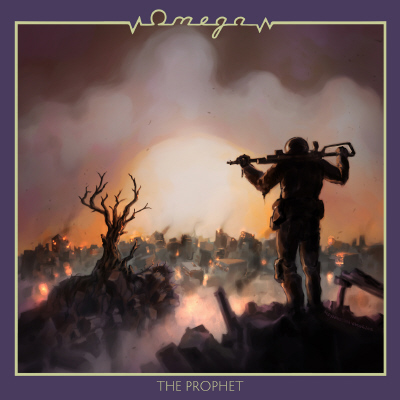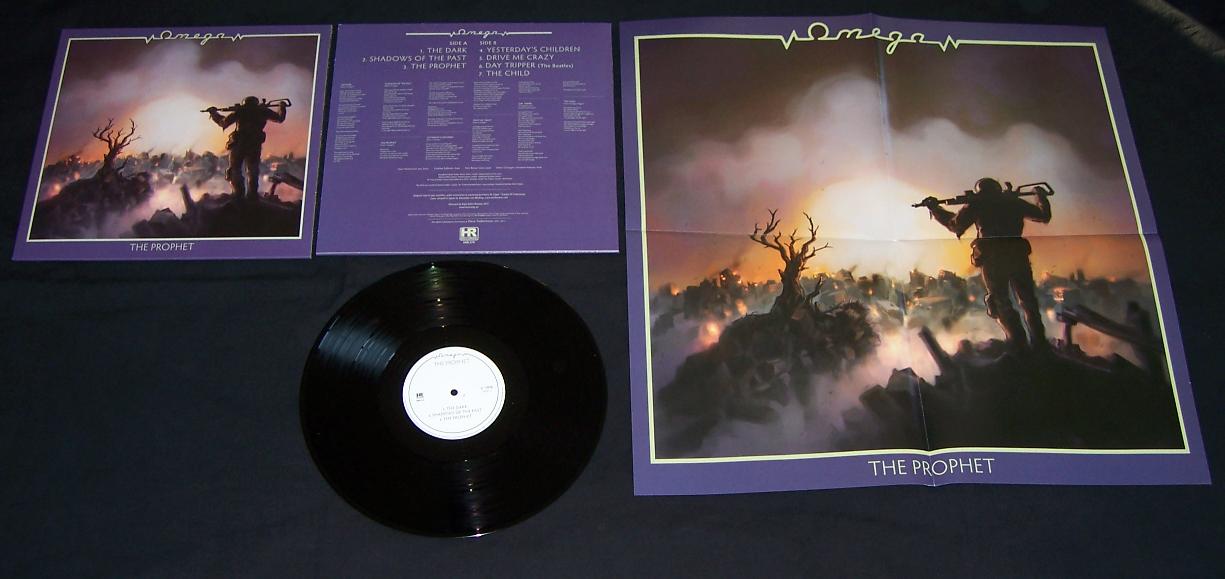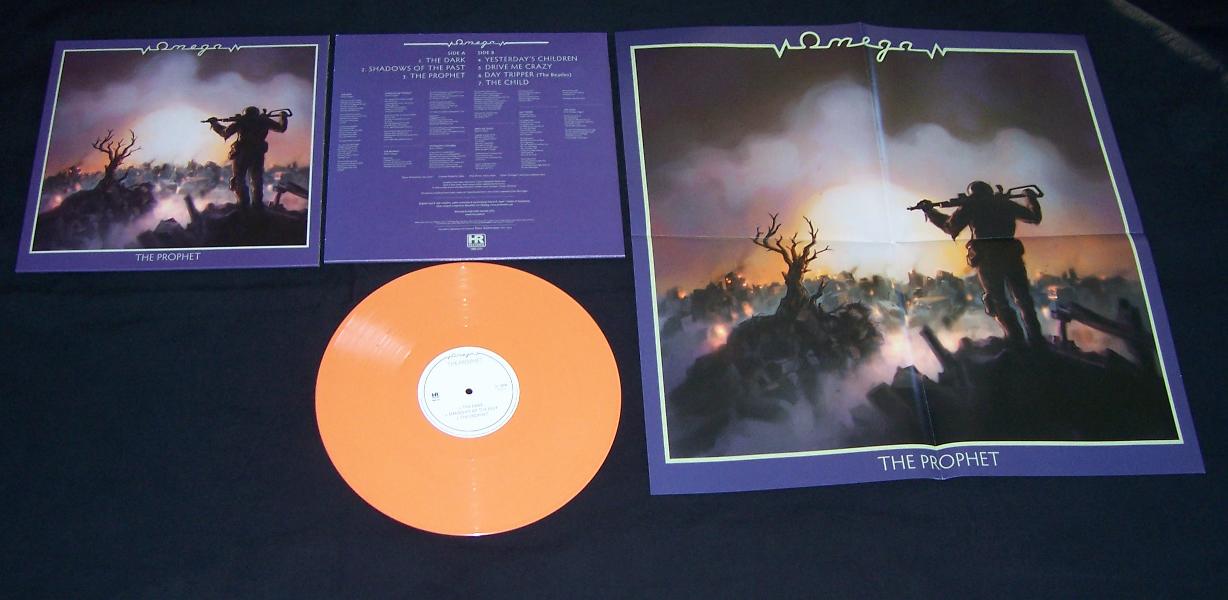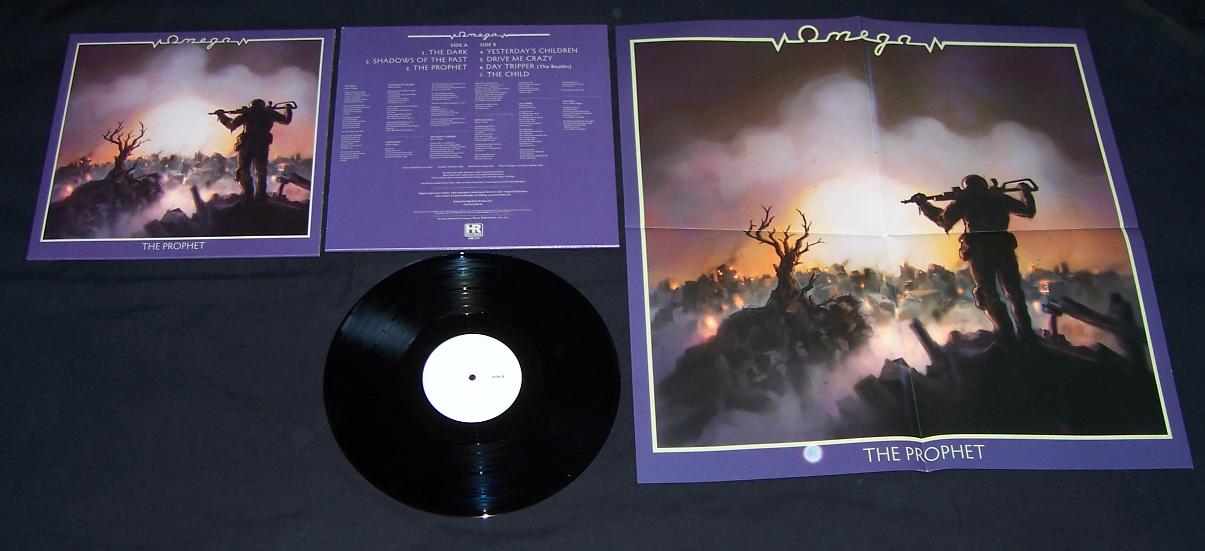 | ||||
| OMEGA - The Prophet LP | |
HRR 279, ltd 300, 100 x orange vinyl + 200 x black vinyl, 425gsm heavy cardboard cover, poster | |
| Dave Robertson - Bass, Vocals Nick Brent Guitars, Vocals Steve Grainger - Guitars (lead), Keyboards, Vocals Graham Roberts - Drums | |
| -The Dark -Shadows of the Past -The Prophet -Yesterday's Children -Drive Me Crazy -Day Tripper (The Beatles cover) -The Child | |
| SOLD OUT! | |
New Wave Of British Heavy Metal act Apocalypse from London was formed by guitarist Steve Grainger around 1980.
The band emerged from two bands in North London. Phaze and Stone Lady. Originally Nick Brent Dave (MEX) Higgen (Stone Lady) and Marc and Steve Grainger.(Phaze) Mex left the band to move in a different direction and to set up the Octave Studio and PA Company in North London. Dave Robertson joined and Apocalypse were established. Ironicalyit was Dave (mex) higgen who named the band APOCALYPSE.
It took the band two years to release their one and only single called "Stormchild" for Gate Records. After minor personnel problems with another band of the same name the band changed their name to Omega and recorded the number “Blood Sacrifice” for Ebony's rather obscure “Metal Warriors” compilation (issued in 1983).
Steve Grainger explains that APOCALYPSE was more or less forced to look for a new name: “We were aware of one other band in the UK called APOCALYPSE, they were completely non-apocalyptic if you ask me. More of a pop band. But they were under the guidance of a major player in the UK music business so we felt that we would have to change our name. I was always against this. I thought they should change their name but I was overruled. We did get a fair bit of music press coverage during the argument though, so it was not all bad news."
“The Prophet” was originally released on Rock Machine (basically a subdivision of Punk label Razor Records) in 1985. The line up consisted of Dave Robertson (bass, vocals), Nick Brent (guitars, vocals), Steve Grainger (lead guitars, keyboards, vocals) and Graham Roberts (drums). The High Roller re-issue of the album comes with new, superior cover artwork. The CD edition contains unreleased demo recordings of “Summertime”, “Heat of the Night”, “Abandon Hope”, “Blood Sacrifice” and “The Child” as exclusive bonus material.
Steve Grainger explains how the original deal with Rock Machine came about in 1985: “There was a sniff of interest from one or two labels but nothing came of it, we weren't considered a big enough band. We would have tried to do it on our own again on Gate Records but then Rock Machine (aka Razor Records) got involved and we took it from there. Rock Machine kept sales figures pretty close to their chests but it was released worldwide on license. Nick and I regained the rights after five years [though, I think,delete this bit SG"> and that's how we are in a position to be re-releasing it again now on our own terms. I guess a few thousand must have been released, you can still pick up the original vinyl online, so they are about.” "The Prophet" was illegally re-issued on vinyl a couple of years back. Those counterfeit copies are annoying to any self-respecting rock band. “I have never traced exactly who was doing what”, states Steve Grainger. “It comes from Comet Records in Italy I believe, probably an original license holder to release the vinyl, but they took it further without permission to create a CD version and stick their logo on it. They are, I suspect, also behind a recent i-tunes/ e-music download. Apple have, to their credit, taken it off their site but I am still dealing with e-music who are less than quick in this matter. I have a copy of the i-tunes payment schedule but it doesn't say who the recipient of the money is.”
Somehow the band Omega was lumped in with a few other progressive-sounding N.W.O.B.H.M. bands like Shiva, Chemical Alice, Legend (Jersey) and Bleakhouse. “We were not bothered about that, really”, says Steve. “We were in our own little bubble, doing our own thing and consciously avoiding whatever was trendy at the time. If people liked what we did that was great, if they didn't, then ... so what? We were in many ways quite reclusive in our writing. I certainly went out of my way to not be influenced too much by other bands. We like to do things our way and that was that.”
The press was pretty kind to Omega in Britain as Steve explains: “The reviews were quite reassuring from the British music press. It was hardly front page stuff as far as they were concerned but they liked it on the whole, Europe was okay with it as I recall. Some French radio station did a show featuring it and from what I gather they loved it, they were particularly enthusiastic about my guitar work … hurrah! It was the American reviews that seemed to put a dampener on the album. I don't think that they got the idea of the prophet being metaphoric, taking it as a literal slur didn't go down too well. Also there was a feeling from them that they didn't want to be reminded about the 'doom and gloom' although funnily enough when the track 'The Final Countdown' was released by Europe, they were all over it like a rash. How wonderful it was to see young musicians with such foresight and wisdom etc., oh well ...”
Guitarist/vocalist Nick Brent explains the meaning behind “The Prophet” in more detail: “Blimey, you could write a thesis on this one! In brief, the song 'The Prophet' describes the persecution of anyone who dares to publicly highlight the injustices inherent in long established organisations, religious or otherwise, or society as a whole. We used the Christian metaphor as the 'Christ' figure is apparent in most religions going back through the ages, representing the need for change when stagnation and decay in society lead to the oppression of sections of the population by the 'Chosen Few'. The ending - 'But why do you still smile?' - echoes both the insecurity of the status quo and the optimism that change can happen.” Quite an intellectual and interesting concept, no doubt about that.
The original cover artwork implies that there might have been an anti-war message involved as well, which Nick confirms. “So the artwork is self explanatory now eh?”, he asks. And adds: “As children who grew up through the cold war with the threat of 'The Bomb', 'The Four Minute Warning', the Vietnam War, Trident etc., and the counter culture of the hippie movement, Greenham Common, Ban the Bomb marches et al, the threat of war was/is a constant in our lives. The human race's seemingly insatiable appetite for all things destructive is, fortunately, matched by a huge capacity for compassion, tolerance and understanding. The battle between good and evil is a constant in our lives.”
The most unusual number on “The Prophet” is without a doubt the cover of “Day Tripper” by the Beatles. “I can't remember whose idea it was”, reflects Steve Grainger. “Definitely not because we were running short of material, our biggest headache was what to leave off the album. With hindsight perhaps we wouild not have used the track on the album as it doesn’t seem to sit right amongst the other tracks, but at the time we decided to include it. It is a yardstick to judge us by if you like - a song that everyone knows given the Apocalypse/Omega treatment. We like doing stuff like that. To be honest, most of the actual guitar riff would never have come from McCartney but we wouldn't have written a song like that. But put together, I reckon we added to it.”
After the release of the album Omega were desperately looking for a tour as Steve remembers: “We had a few leads in that direction. But … in those days getting on tour as a support act to a bigger named band cost money … you know … the old handful of dosh in an envelope sort of thing. We even got given a price. 25 grand! That's £25,000, in those days a shed load of money. It only cost two or three grand to do the recording. Either way, Rock Machine wouldn't cough up the money so we were effectively stuffed. We were by then a bit too big for the smaller London pubs and clubs but not big enough for the bigger London venues, hence we did most of our London gigs at the Marquee, either as support to such bands as Pendragon, Rock Goddess, Clive Burr's Escape, (they were in effect Praying Mantis in all but name) or as a headline act ourselves.”
Unfortunately, “The Prophet” remained Omega's one and only album: “We still had loads of material but without reasonable record company backing we didn't have the means to go back into the studio again. It was only later on with the reforming of Apocalypse that we had our own studio set up and could muck about with all the ideas we'd had, but Nick had gone off to concentrate on other projects and I was working with other songwriters. Mind you, it has to be said that the talk of of new songs has often been bandied around between me and Nick. Sadly, the passing of Dave Robertson was a bitter blow to us and it seemed like that was the end of it all. Who knows, our original bass player Mex may well have the time to get involved in a new project, as you may know he played some stuff on the 'Abandon Hope' album. So there you go. Never say never … it might happen yet!”
Matthias Mader


